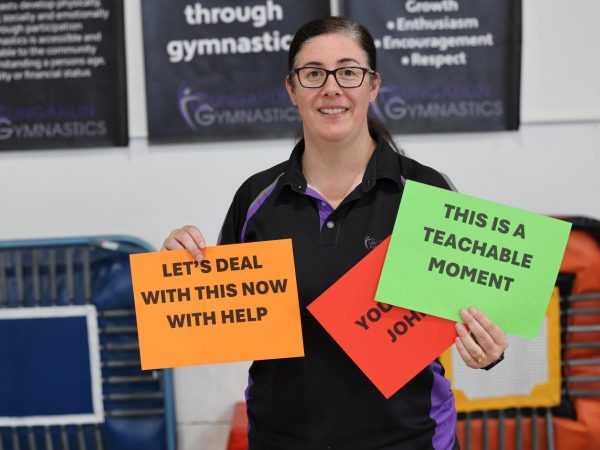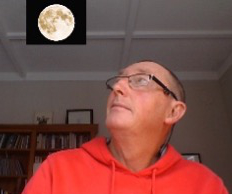Megan Moss
Megan Moss aims to be a revolutionist.
As the owner of a gymnastics club in Canberra, Australia, that employs over 60 coaches, Megan is determined to revolutionise coaching in the sport of gymnastics to provide an environment that is participant centric and where the values of the club are at the forefront of everything the coaches do.
Starting her coaching career at the age of 12 in the sport of hockey, Megan found a passion for sharing the joy of sports participation early and has coached in hockey, dance and gymnastics for over 30 years.
Having experienced a variety of coaching methods and approaches in her own sporting career,
Megan quickly established the impact a coach can have on a participant’s motivation and long-term participation in sport. Her experiences shaped the coach she is today that is focused on inclusion, fun and engagement.
She is a master in group management and loves using analogies in coaching to enhance understanding, learning and engagement of her participants.
She leads a team of over 60 coaches in her club where she aims to impart her positive, inclusive approach to coaching and leads the training and development of the coaching team at Gungahlin Gymnastics.
HOW DID YOU GET INTO THE CD ROLE?
"It starts with a love story!
It starts with a love story! I met my husband Joel, a former Australian representative gymnast, in year 11 at school and we joked that one day we would open our own gymnastics club.
With life’s journey, that joke became a reality in early 2015 when we made the leap and decided to open Gungahlin Gymnastics.
From day one, we knew that we wanted to deliver the sport of gymnastics differently. We set our values early and aimed to deliver gymnastics, in all its forms, in a FUN and positive environment. Initially we started with just Joel and I coaching and 16 classes on our timetable.
The club took off quickly and we employed our first coach to work with us within 12 weeks of opening due to the strong demand. It has been a roller coaster since then and we now have just over 1500 gymnasts in the club and over 60 coaches.
I lead the coach development and training aspects of the business and this is an area I love, creating the next generation of coaches delivering gymnastics “the Gungahlin way”.
BEST PARTS ABOUT THE ROLE
Without a doubt seeing my coaching team engaged and enjoying their role is the best part.
Coaching kids is not an easy gig, we get kids at their best and their worst and seeing my team adapt their coaching and work so hard to engage their participants and keep it fun is so rewarding.
My coaches for the most part are young students, most of whom might not become career coaches however when departing their role with us, leave with skills that will serve them in so many ways. I get to see them grow as individuals while sharing the joy they have for the sport of gymnastics with the next generation.
SUPPORT FOR COACHES
We operate in a sport that is very structured and focused on pathways and compliance in terms of what you can coach and competitive gymnastics.
I respect that part of the sport however my support for my coaches extends well beyond a formal coaching accreditation and is focused more on our values, living those values as a coach and coaching to create an environment that is always fun and positive.
We do a lot of work with our coaching team on the soft skills of coaching, how you interact with your participants, what engaged coaching looks like in practice and how you create the right environment to enable the fun while balancing the needs of diverse groups.
Given we operate across two facilities, and I can’t be in two places at once, I have a team of Floor Managers who monitor things on the floor and report each day on how coaches are going and if they need more training or support in certain aspects of their coaching.
These insights provide me with the topics that form part of our twice yearly all staff workshops where we bring the whole team together to work on challenges and scenarios to further develop the soft skills of the team.
I also use this feedback to engage directly with individual coaches to provide more targeted support as required to help them be the best coach they can be.
IF YOU HAD MORE RESOURCES
Time is my most challenging resource – running a small business is very challenging and I wish I had more time to dedicate to coach development. If I had all the time in the world, my focus would be on more explicit coaching practices to ensure development and progression of participants and specialised training for my staff in handling participants with additional needs.
DO YOU WORK IN PARTNERSHIP WITH OTHER CDs?
I have working alongside me two full time staff who are also qualified Club Coach Educators who help me deliver training and workshops. Their expertise is in differing areas to my expertise so we complement each other well.
I also collaborate with lots of people outside of our sport to hear what others are doing, to discuss challenges and to network and hear best practice operations to learn more. The learning for me never stops!
DO YOU HAVE A MENTOR?
I don’t have a formal mentor for the coach development side of my role however I engage with some outstanding people in the field like Gene Schembri to further my learning and seek support.
I have a general life mentor in my big sister who is my biggest cheerleader and who is the one that gives me pep talks when I am experiencing imposter syndrome.
MY TOP 5 COACH DEV TIPS
- Tell the story, the story of the impact positive coaching can have on a participant and the coaches’ role in this.
- Encourage coaches to reflect on coaches or teachers they have had that brought out their best and how those coaches delivered lessons and training to do that and how they can do the same.
- Don’t take it too seriously – at the end of the day, we are dealing with kids sport. Sport is meant to be fun and the goal should always be engagement and retention. Don’t lose sight of the fact this is kids sport.
- Learn the soft skills more than the technical skills and always stay connected to the grassroots. It is very easy to coach high level athletes who know what to do, you truly earn and maintain your coaching stripes coaching in the grassroots.
- Never stop learning. Always seek out new information, especially from outside your sport and continue to learn and develop as a coach developer and in your own coaching.



 By Gene Schembri
By Gene Schembri
 By Brett Reid
By Brett Reid